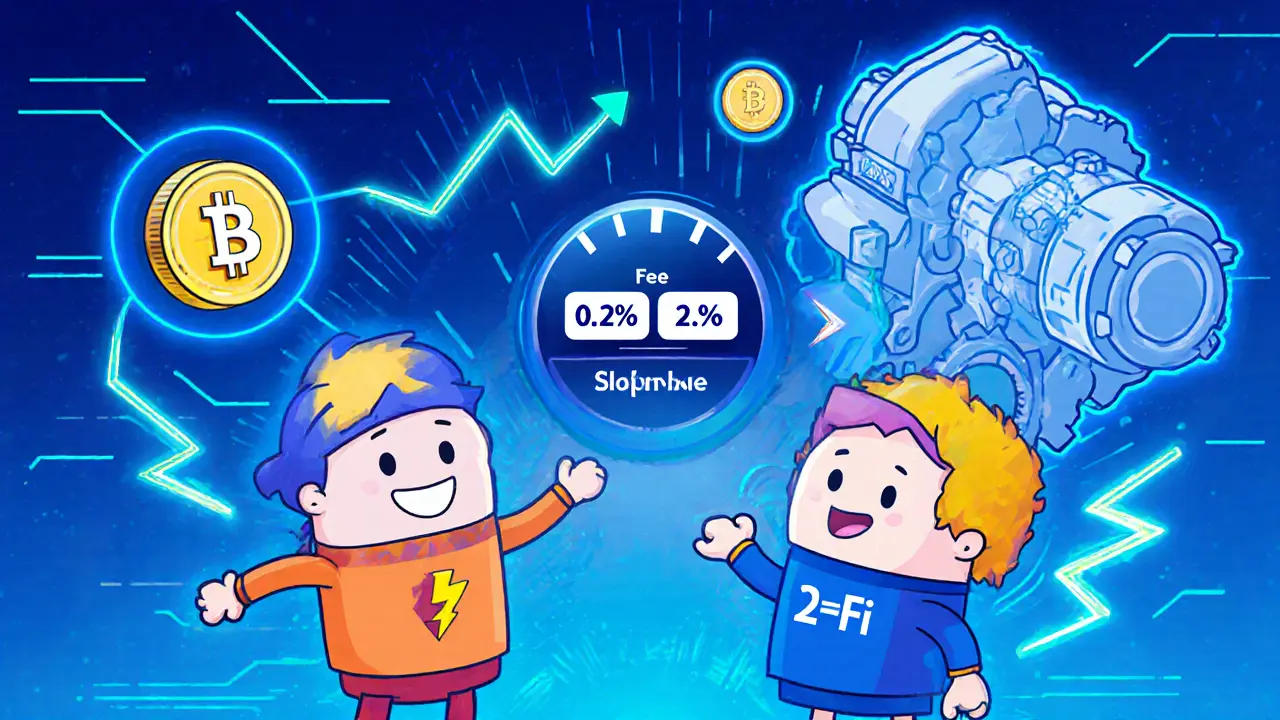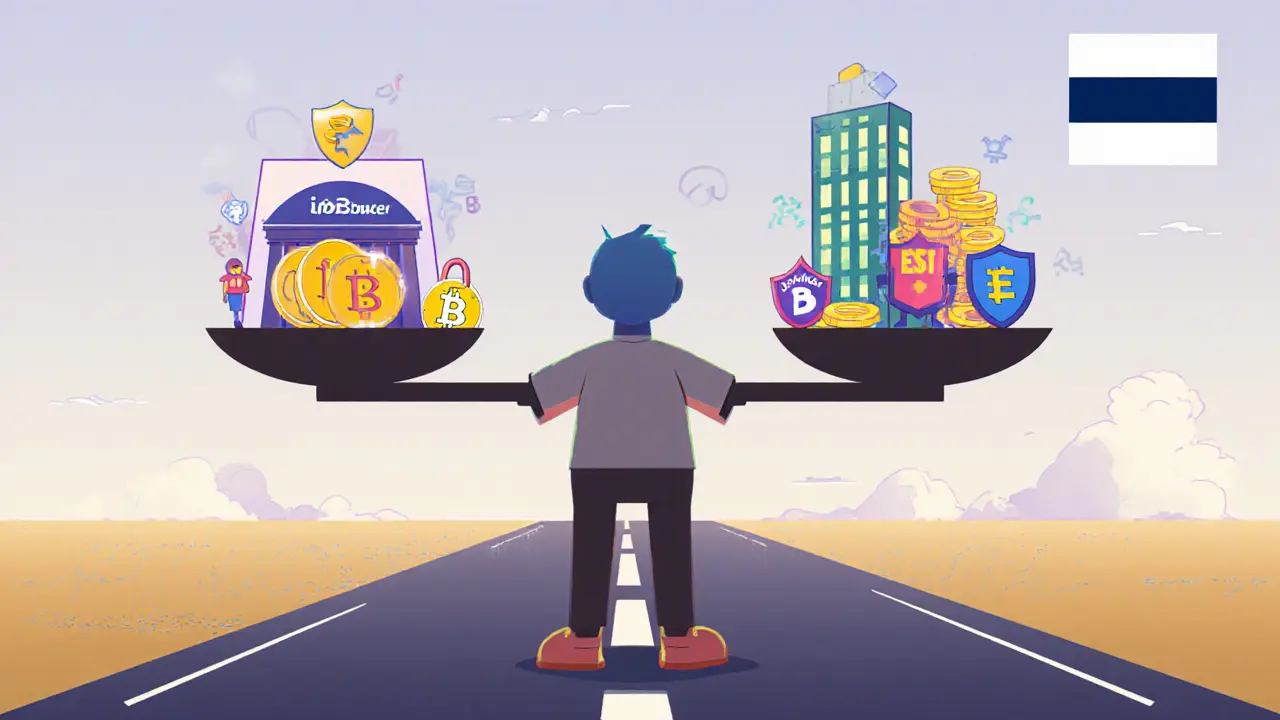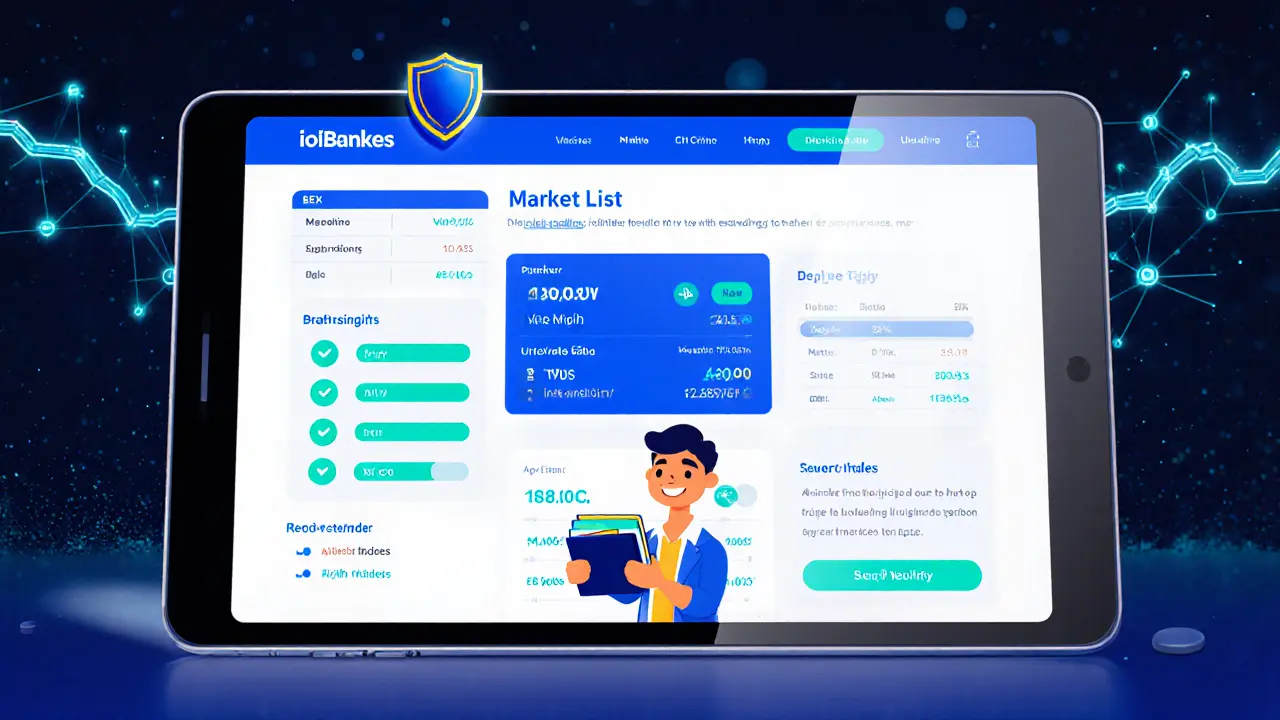ioBanker Slippage Calculator
Estimate how much your trade might be affected by slippage on ioBanker DEX. Remember, low liquidity can cause significant price movement on this exchange.
When exploring niche crypto platforms, ioBanker DEX is a decentralized exchange built on the BitShares blockchain that launched in December 2018 and operates out of Estonia. It markets itself as a supporter of “HONEST” DeFi protocols, aiming to give users peer‑to‑peer trading without a central custodian.
Quick Takeaways
- ioBanker DEX targets a niche BitShares‑centric DeFi audience.
- Supported assets are limited to a few dozen tokens, far fewer than major CEXs.
- Fees are modest (0.1‑0.3% on swaps) but hidden costs can arise from low liquidity.
- Security information is scarce; no public audit reports or insurance scheme.
- Regulatory status in Estonia is unclear - users should treat the platform as high‑risk.
What Sets ioBanker Apart?
The exchange’s biggest differentiator is its deep integration with the BitShares ecosystem. While most DEXs such as Uniswap or SushiSwap run on Ethereum‑compatible chains, ioBanker stays on the older, delegated‑Proof‑of‑Stake BitShares ledger. This means transaction finality is almost instant and fees are lower than Ethereum‑based swaps, but the trade‑off is reduced developer tooling and shrinking community activity.
How a Decentralized Exchange Works
In a DEX, users retain control of their private keys and trade directly from their wallets. Orders are either matched on‑chain (as with Uniswap’s automated market maker) or via off‑chain order books that settle on the blockchain. ioBanker uses a hybrid model: an on‑chain settlement layer backed by BitShares smart‑contract‑like assets, combined with an off‑chain order‑matching engine that speeds up trade execution.
Feature Comparison with Major Platforms
| Exchange | Assets Supported | Fee Range | Centralized? | Notable Feature |
|---|---|---|---|---|
| ioBanker DEX | ≈ 30 tokens (BitShares‑based) | 0.1% - 0.3% | No | HONEST DeFi protocols on BitShares |
| Uniswap (v3) | ≈ 5,000 tokens (Ethereum) | 0.05% - 0.30% | No | Concentrated liquidity, wide token list |
| Coinbase | 235 assets | 0% - 3.99% | Yes | FDIC‑insured cash, regulatory compliance |
| Kraken | 350+ assets | 0% - 0.4% | Yes | Zero‑fee maker tier, strong security record |
| Binance US | 158 assets | 0% - 0.6% | Yes | High liquidity, futures & margin |

Fees & Asset Support
ioBanker charges a flat 0.2% taker fee on most swaps, with a modest 0.1% discount for makers who place limit orders. There are no withdrawal fees for BitShares‑native assets, but moving tokens to other chains requires a bridge that can incur extra network costs. Compared to the Coinbase fee structure (0% for small‑volume makers to 3.99% for credit‑card purchases), ioBanker looks cheap on paper. The real cost, however, often shows up in price slippage because the order books are thin - a $1,000 trade can move the market price by 2‑3% on a low‑liquidity pair.
Security & Regulatory Landscape
Security is the Achilles’ heel of any crypto platform. Major exchanges publish regular audits, bug‑bounty programs, and proof‑of‑reserve reports. ioBanker, by contrast, offers no public audit, no insurance fund, and no evidence of a formal security partner. The BitShares network itself has never suffered a major hack, but that does not automatically protect an exchange that runs its own matching engine.
Estonia has historically been crypto‑friendly, granting exchange licenses under the Virtual Currency Service Provider regime. In recent years the country tightened KYC/AML rules, demanding robust transaction monitoring. ioBanker does not display a license number or a compliance policy on its site, making it impossible to verify whether it meets the latest Estonian requirements. Users should treat the platform as unregulated and be prepared to lose funds without recourse.
User Experience & Community
The UI is intentionally simple: a three‑pane layout for market selection, order entry, and recent trades. Newcomers familiar with Binance or Kraken will find the dashboard sparse - there are no advanced charting tools, no fiat on‑ramps, and limited help documentation. The only community channel is a modest Telegram group with under 300 members, where most conversations revolve around BitShares price alerts. No 24/7 live support exists, and ticket response times can stretch beyond 48 hours.

Pros & Cons
- Pros
- Instant settlement on BitShares (seconds, not minutes).
- Low on‑chain transaction fees.
- Focus on “HONEST” DeFi protocols that aim for transparent governance.
- Cons
- Very limited token selection - unsuitable for diversified portfolios.
- Liquidity is thin; large trades suffer noticeable slippage.
- Lack of public security audits and regulatory clarity.
- Minimal customer support and tiny community.
Should You Trade on ioBanker?
If you already hold BitShares‑based assets and need a quick, low‑fee swap without moving funds to a centralized service, ioBanker can be handy. For anyone looking for a broad asset list, robust security guarantees, or fiat on‑ramps, sticking with established exchanges like Kraken or Coinbase makes more sense.
In short, treat ioBanker as a specialized tool rather than a primary gateway to the crypto market. Conduct your own due diligence, start with small amounts, and always keep backups of your private keys.
Frequently Asked Questions
Is ioBanker DEX regulated in Estonia?
No public license number or compliance policy is displayed, so it’s unclear whether ioBanker holds a current Estonian virtual‑currency service provider license. Users should assume it operates without formal regulatory oversight.
What assets can I trade on ioBanker?
The exchange mainly lists BitShares‑issued tokens and a handful of DeFi assets built on the same chain - roughly 30‑plus trading pairs at the time of writing.
How do fees on ioBanker compare to other DEXs?
ioBanker’s taker fee sits at about 0.2%, similar to many Ethereum DEXs. However, thin liquidity often leads to higher effective costs due to slippage, making actual fees higher than the headline rate.
Is there any insurance or fund protection?
ioBanker does not advertise any insurance policy or proof‑of‑reserve audits, unlike Coinbase’s FDIC‑insured cash balances or Kraken’s insurance fund.
Can I use fiat on ioBanker?
No. The platform only supports crypto‑to‑crypto swaps; users must first acquire BitShares or supported tokens on another exchange.

Prerna Sahrawat
March 16, 2025 AT 07:10When I first inspected the ioBanker DEX, the sheer ambition of grafting a contemporary DeFi experience onto the venerable BitShares chain was nothing short of theatrical; the platform flaunts instant settlement, which, in my view, borders on hubristic optimism. The token roster, limited to a few dozen, reads like an exclusive soirée where only the most privileged assets are invited, effectively marginalizing the average trader. Fee structures appear modest on paper-0.1 % to 0.3 %-yet the lingering specter of slippage in thin markets erodes that veneer of affordability. Moreover, the absence of a public audit feels like a dark curtain drawn over a stage where the security choreography is left to imagination. Estonia’s regulatory haze only compounds the drama, prompting investors to treat the exchange as a high‑risk performance art piece. Nonetheless, for a BitShares aficionado, the ability to swap without relinquishing custody may justify the occasional melodramatic sigh. In essence, ioBanker is a niche exhibit that dazzles a select audience while remaining a bewildering maze for the uninitiated.
Joy Garcia
March 24, 2025 AT 03:47The whole ioBanker charade reeks of a shadowy cabal pulling strings behind a glossy interface; one can’t help but wonder if the “HONEST” badge is a subliminal meme designed to lull the unsuspecting into complacency. Their supposed low fees are likely a smokescreen while hidden costs-exorbitant slippage, opaque bridge fees-drain wallets like unseen taxes. The lack of any audit or insurance feels like a deliberate omission, as if the operators anticipate a future where regulators finally crack down and the platform simply vanishes. I suspect the Estonian licensing is nothing more than a paper tiger, a façade to legitimize a venture that thrives on the ignorance of naïve crypto romantics. In short, proceed with the caution of someone stepping through a field of landmines, and never, ever stake more than you can afford to lose.
Benjamin Debrick
April 1, 2025 AT 01:24ioBanker presents itself as an avant‑garde solution within the BitShares ecosystem; however, a meticulous examination reveals a tapestry woven with both promise and peril. Firstly, the token selection, constrained to approximately thirty assets, limits diversification opportunities for the discerning investor; this restriction inevitably intensifies market impact for sizable trades. Secondly, the advertised fee regime-0.1 % for makers and 0.2 % for takers-while ostensibly competitive, fails to account for the substantial slippage inherent in shallow order books; the resultant effective cost can surpass even the most generous centralized exchange fee structures. Thirdly, the absence of publicly disclosed security audits or third‑party attestations engenders a climate of uncertainty; without verifiable proof of reserves, users are left to trust opaque internal processes. Fourthly, regulatory ambiguity in Estonia, where the platform ostensibly operates, compounds risk; no verifiable licensing identifier is displayed, and compliance documentation remains elusive. Fifthly, the hybrid settlement model-combining on‑chain finality with off‑chain matching-introduces an additional layer of complexity that may obscure failure points, particularly under conditions of heightened network congestion. Sixthly, user experience suffers from a minimalist interface that eschews advanced charting tools, fiat on‑ramps, and comprehensive support resources; this austerity may deter novices while offering little advantage to seasoned traders. Seventhly, community engagement appears limited to a modest Telegram group, whose low membership and sluggish response times diminish the platform's capacity for rapid issue resolution. Eighthly, the platform’s reliance on BitShares’ delegated Proof‑of‑Stake consensus confers rapid transaction finality, yet simultaneously inherits the legacy constraints of an older blockchain architecture, including reduced developer tooling and a contracting ecosystem. Ninthly, while the “HONEST” DeFi designation suggests transparent governance, no concrete mechanisms or voting frameworks are publicly outlined, leaving users to speculate on the true nature of decision‑making processes. Tenthly, the necessity of bridges to transfer assets beyond BitShares introduces ancillary network fees and potential custodial vulnerabilities, further eroding the purported cost advantage. Eleventh, the lack of insurance or fund protection mechanisms starkly contrasts with offerings from established exchanges that provide FDIC‑insured cash balances or dedicated insurance pools. Twelfth, the platform’s ostensible focus on peer‑to‑peer trading aligns with decentralization ideals, yet the practical ramifications of limited liquidity render the experience akin to trading in a sparsely populated marketplace. Thirteenth, the documentation provided is sparse, lacking detailed technical specifications that would enable thorough independent security review. Fourteenth, the overall risk profile of ioBanker, when synthesized from these disparate factors, suggests a high‑danger environment necessitating rigorous due diligence and conservative exposure limits. Finally, prospective users should weigh the marginal benefits of low on‑chain fees against the substantial operational and security uncertainties that permeate the current iteration of the service.
Anna Kammerer
April 8, 2025 AT 22:00While the alarm bells sound loud, the practical takeaway is simple: treat ioBanker as a boutique tool rather than a primary exchange, and keep your exposure minimal to avoid the drama of unexpected losses.
Mike GLENN
April 16, 2025 AT 18:37For anyone already holding BitShares‑based assets, ioBanker can serve as a convenient conduit, especially when the priority is swift settlement without the friction of fiat on‑ramps. The platform’s fee schedule is indeed lower than many Ethereum‑centric DEXs, which can translate into tangible savings on modest trade sizes. However, the thin liquidity on many pairs means that attempts to execute larger orders may suffer noticeable price impact, effectively negating the fee advantage. Users should therefore calibrate their trade size to the depth of the order book and consider splitting sizeable positions into multiple smaller swaps to mitigate slippage. On the security front, while the underlying BitShares network has a solid track record, the exchange’s own matching engine operates off‑chain and lacks publicly vetted audits, introducing an additional layer of trust that users must extend. Regulatory opacity remains a concern; without a clear licensing framework, users in jurisdictions with strict AML/KYC requirements may face complications when attempting withdrawals. In practice, a prudent strategy involves allocating only a modest portion of your portfolio to ioBanker, using it for quick, low‑value swaps, and relying on more established exchanges for larger, diversified holdings.
Erik Shear
April 24, 2025 AT 15:14Avoid it.
Tom Glynn
May 2, 2025 AT 11:50Exactly! 🚀 Keep those swaps small and you’ll dodge the slippage monster while still enjoying the ultra‑fast finality. 👍
Johanna Hegewald
May 10, 2025 AT 08:27If you’re new to BitShares, start by moving a tiny amount to ioBanker, test a swap, and verify the fees before scaling up.
Jessica Pence
May 18, 2025 AT 05:04Thats a good tip, but also remeber to double check the address you copy, a single wrong char can sent ur tokens to void.
johnny garcia
May 26, 2025 AT 01:40In the grand tapestry of decentralized finance, platforms such as ioBanker embody the tension between accessibility and custodial sovereignty; thus, a discerning participant must weigh the epistemic value of autonomy against the pragmatic imperatives of security and regulatory compliance. 🧭
Andrew Smith
June 2, 2025 AT 22:17Well said! Embracing the autonomy while staying vigilant is the sweet spot – keep experimenting, but always with a safety net.
Ryan Comers
June 10, 2025 AT 18:54Honestly, the whole crypto hype is a globalist distraction; if you’re looking for genuine financial freedom, stick with home‑grown solutions and ignore these exotic BitShares experiments.
mike ballard
June 18, 2025 AT 15:30While the nationalist sentiment is noted, from a fintech perspective the interoperability afforded by BitShares‑based DEXs offers cross‑border liquidity channels that can buffer against regional economic volatility.
Molly van der Schee
June 26, 2025 AT 12:07Every platform has its quirks, and ioBanker’s niche focus could actually foster a close‑knit community that drives innovative DeFi use‑cases down the line.
Mike Cristobal
July 4, 2025 AT 08:10Just remember, diving into unregulated waters without proper safeguards is ethically questionable; protect your peers by advocating for transparency and accountability.